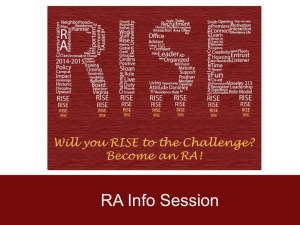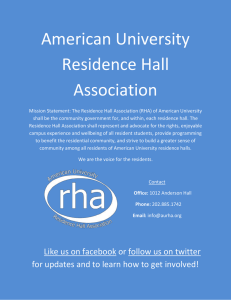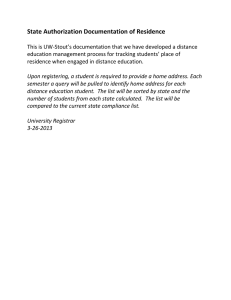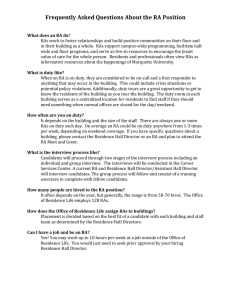Position Description Resident Assistant
advertisement
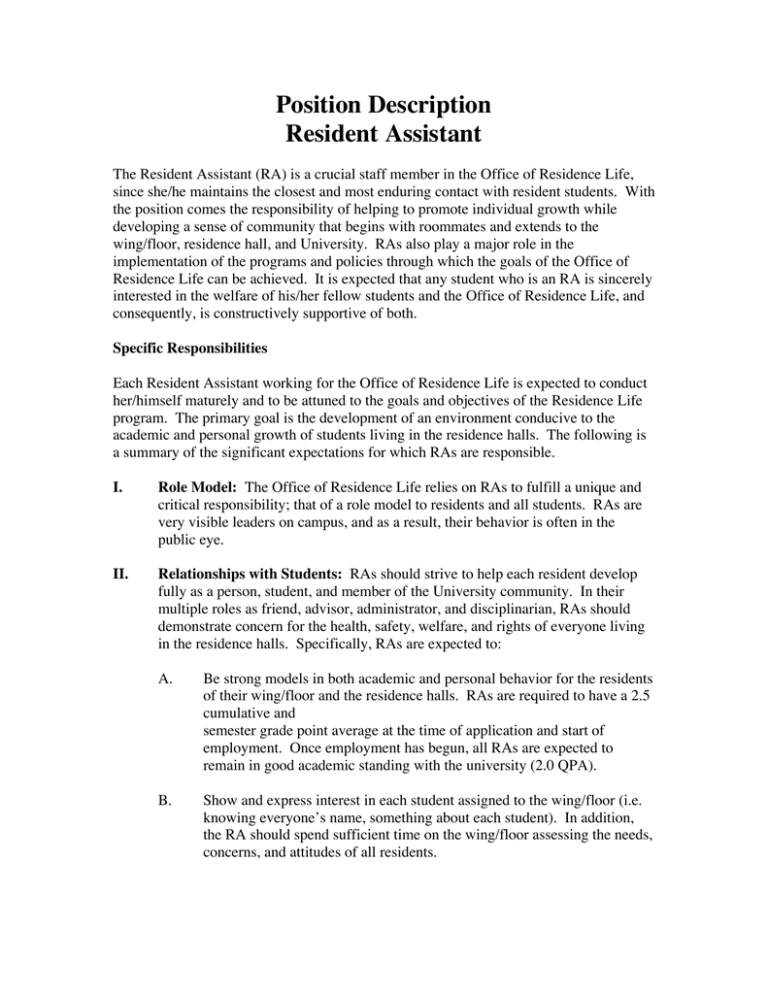
Position Description Resident Assistant The Resident Assistant (RA) is a crucial staff member in the Office of Residence Life, since she/he maintains the closest and most enduring contact with resident students. With the position comes the responsibility of helping to promote individual growth while developing a sense of community that begins with roommates and extends to the wing/floor, residence hall, and University. RAs also play a major role in the implementation of the programs and policies through which the goals of the Office of Residence Life can be achieved. It is expected that any student who is an RA is sincerely interested in the welfare of his/her fellow students and the Office of Residence Life, and consequently, is constructively supportive of both. Specific Responsibilities Each Resident Assistant working for the Office of Residence Life is expected to conduct her/himself maturely and to be attuned to the goals and objectives of the Residence Life program. The primary goal is the development of an environment conducive to the academic and personal growth of students living in the residence halls. The following is a summary of the significant expectations for which RAs are responsible. I. Role Model: The Office of Residence Life relies on RAs to fulfill a unique and critical responsibility; that of a role model to residents and all students. RAs are very visible leaders on campus, and as a result, their behavior is often in the public eye. II. Relationships with Students: RAs should strive to help each resident develop fully as a person, student, and member of the University community. In their multiple roles as friend, advisor, administrator, and disciplinarian, RAs should demonstrate concern for the health, safety, welfare, and rights of everyone living in the residence halls. Specifically, RAs are expected to: A. Be strong models in both academic and personal behavior for the residents of their wing/floor and the residence halls. RAs are required to have a 2.5 cumulative and semester grade point average at the time of application and start of employment. Once employment has begun, all RAs are expected to remain in good academic standing with the university (2.0 QPA). B. Show and express interest in each student assigned to the wing/floor (i.e. knowing everyone’s name, something about each student). In addition, the RA should spend sufficient time on the wing/floor assessing the needs, concerns, and attitudes of all residents. III. C. Recognize their counseling skills and limitations and consult the Hall Director about all problems on the wing/floor. Maintain appropriate confidentiality with the residents while working in coordination with the Hall Director. D. Know the procedures for utilizing the services provided by University referral agencies such as the Counseling Center, Student Development, Student Health, and Public Safety. E. Provide leadership and programming in the area of understanding, appreciating, and celebrating diversity. Student Conduct: RAs are responsible for facilitating mature behavior to the extent that an atmosphere conducive to study be maintained and physical facilities are protected for student use in the future. RAs are responsible for following and enforcing University and departmental policies consistently throughout the residence hall. Equally important is the need to impress upon residents that they are responsible for their own actions. Under no condition should RAs tolerate immature behavior or improper conduct. Specifically, RAs are expected to: A. Know the existing policies and procedures for handling violations of university and residence hall regulations, especially drug and alcohol abuse, theft, noise, and visitation violations. B. Consult with the Hall Director regarding appropriate methods to deal with problems they encounter. C. Respond to behavior problems and emergencies quickly, calmly, consistently, and effectively. D. Recognize the importance of making decisions that are consistent with the procedures set forth by the Department of Residence Life. E. Confront inappropriate behavior which may denigrate, discriminate against, or harass individuals or groups on the basis of their gender, race, ethnicity, religion, etc. F. Recognize, appreciate, and celebrate positive behavior that encourages an educational and learning environment. IV. V. Programming and Hall Government: Since participation by hall residents in informal and planned programs enhances the residence hall living environment, RAs are responsible for developing and assisting student government and the Hall Director in accomplishing programming activities. Specifically, RAs are expected to: A. Actively participates in the planning and implementation of developmental programs each semester. B. Encourage residents to participate and contribute to hall programs. C. Identify and involve potential student leaders in hall programming. D. Demonstrate support of the hall council. Administration: The smooth operation of a residence hall is dependent upon the cooperation and support of all staff members. RAs will be called upon to perform administrative tasks which are important to the operation of the hall. Specifically, RAs are expected to: A. Complete all assigned administrative tasks thoroughly, accurately, and on time (i.e. weekly reports, roster changes, check-in, check-out, secure keys, and other University property.) B. Post all current notices and communications from the Department of Residence Life, Hall Director(s), and other authorized student organizations. C. Maintain open and frequent communication with the Residence Hall Facilities Manager about hall facilities. D. Assist the Custodial and Maintenance staff in identifying facilities in need of repair or specific custodial attention. F. Offer suggestions for the improvement of the position, the hall, and the Residence Life program. G. Participate in and complete EDUC 102, “Principles of Peer Facilitation Among College Students.” VI. Communication: RAs play a crucial part in setting the tone for how the residence halls are perceived by students. RAs represent the University and the department of Residence Life to students, parents, and the general public. RAs are also expected to communicate and/or represent suggestions, ideas, and constructive criticism to the Hall Directors for sharing with the Department of Residence Life. VII. Personal Development: Being an RA provides many opportunities for personal growth. While the RA must assume the major responsibility for personal development she/he is provided with training, supervision, and numerous opportunities for learning. To this end, RAs are expected to: A. Participate in all spring, fall, and winter training sessions. B. Participate and initiate in-service training programs. C. Attend weekly staff meeting and/or other meetings deemed appropriate by the Hall Director. D. Consult with the RHD regularly to discuss performance and personal concerns. E. Participate on committee/task forces whose purposes will be to explore and develop student life in the residence halls and assist the Office of Residence Life in the creation and review of equitable policies and procedures.
